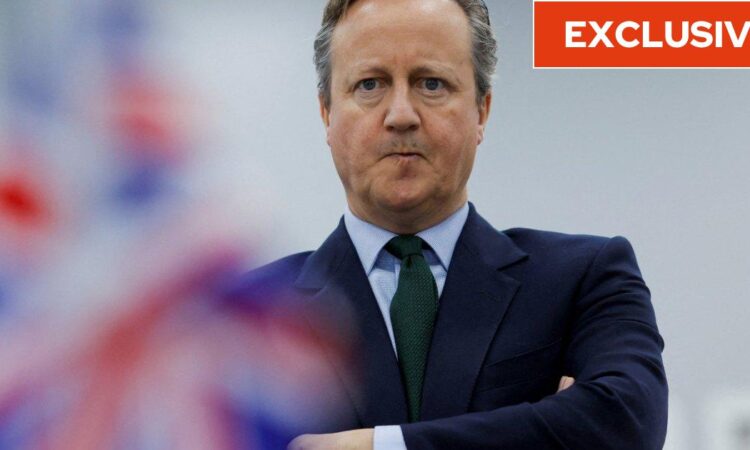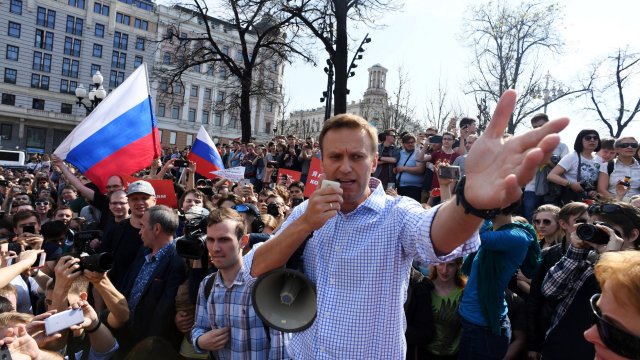
David Cameron’s plan to seize Russian central bank assets to pay for the rebuilding of Ukraine is facing resistance from bankers in the City of London, i has learnt.
The proposal is part of the Foreign Secretary’s continued push for tougher and better enforced Russian sanctions at the G20 and UN this week ahead of the second anniversary of Vladimir Putin’s invasion of Ukraine on Saturday, and in response to the death of Alexei Navalny.
Cameron has said there is a moral and economic case for using the £250 billion of assets held in Western banks to rebuild Ukraine. Around £26bn of that is said to be held in the UK.
i has learnt that his plan to use Russian central bank assets frozen in the West to pay for the reconstruction of Ukraine, raised with G7 allies over the weekend, is facing opposition in the City.
Financiers are understood to be concerned that state seizure could damage trust among clients who may not want to bank in the UK if their assets are at risk of being taken in future.
A senior global banking executive based in London told i that banks are also poised to demand legislation if Cameron goes ahead with the plan as they are concerned seized assets will be used to top up Treasury coffers rather than rebuild Ukraine.
i has been told that banks’ concerns about damaging trust among clients extend beyond simply private assets to state-owned and central bank holdings.
The EU has also been resistant to plans to confiscate central bank assets amid concerns about legality and the impact on the global financial system. Similar concerns were raised with UK ministers attending the Davos global finance summit, i has been told.
As well as looking at central bank assets, the Government is working on a plan to allow holdings in sanctioned individuals’ frozen accounts to be used for Ukraine reconstruction.
The Government already has the power to keep assets frozen until Russia pays for the damage it has caused and to compel sanctioned individuals to disclose assets they have in the UK.
Setting out calls for legislation, the senior banking executive told i: “It would be a new area of law that may leave the bank handing over the seized assets liable to the Government. This is what the banks are looking into.
“Sanctions would require banks, or some other financial institution to freeze assets, and without any specific ‘proceeds of crime’ type legislation, the Government could just say that they will match any frozen assets with donations to Ukraine.
“The Government may commit to sending money to Ukraine, but without any actual legislation linking the seized assets to a fund for Ukraine’s reconstruction, then anything the Treasury did get from the oligarchs would just go in Government coffers.
“A promise to hand the cash to Ukraine would be just that – a promise.”
Conservative MP Bob Seely, who chairs the all party parliamentary group on Russia, said “taking state assets should be doable” but agreed that it may be difficult to target oligarchs who have not been found to have broken any laws.
“So I think state assets are the way to go – Russian state assets overseas are vast and will be more than enough to pay for, frankly, Ukraine’s arms and reconstruction.
“We should hold these other people’s assets indefinitely because they are the enablers of Putin’s regime – they did not become rich because they are smart or because they have great ideas, but as part of a morally criminal, if not legally criminal seizure, and privatisation of [Russian] assets.”
But Mr Seely acknowledged that banks have “got a point” with concerns about the seizure of private assets.
“As frustrating as it is that all these very bad people who have enabled Putin’s regime could go scot-free, we have to find an intelligent way of dealing with them rather than just extra-judicially taking stuff.
“It is a morally frustrating position but the City of London has for better or worse, got a point.”
Harriet Baldwin, Tory MP and chair of the Commons Treasury Committee, told i: “It’s important that allies work together to come up with an internationally coherent approach that puts the maximum possible pressure on Russia to end its illegal invasion of Ukraine.”
Downing Street on Monday said it could not comment on possible future sanctions but said the UK had agreed the “most comprehensive package of sanctions ever brought to bear on a major economy” in response to Russia’s invasion of Ukraine.






